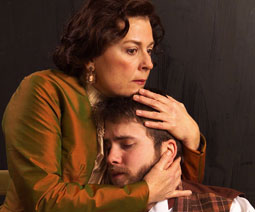Cynthia Mace in "Ghosts"
by Anthony Chase

Cynthia Mace, who is starring as Mrs. Alving in the current production of the Ibsen classic, Ghosts, at Studio Arena Theatre, last worked at the theater nearly 20 years ago. Legendary Studio Arena publicist and historian Blossom Cohan recalls, “It was an English play; I remember her with an English accent.” Indeed it was, confirms Mace. The show was a production of Michael Frayn’s Benefactors.
Mace’s resume is filled with English plays. She has, in fact, a great facility for doing accents. “When I was a student, I lived in Scotland with an extraordinary family. They became a permanent part of my life and had relations all over the UK. I know many accents, Liverpool, Northern English accents. They’ve been very good to me.”
In fact, Mace’s facility with accents helped her land the role of the Lynn Redgrave character in Redgrave’s autobiographical play, The Mandrake Root.
“The play was based on her mother, the actress Rachel Kempson, and follows her life from the age of 20 to the age of 80. In it, I played ‘Sally,’ a character based on Lynn. Friends of hers from England who came to see us told her that they could not tell that I was not English. That made me very happy. Auditioning for Lynn was quite an experience. I was not intimidated, but I was very aware that I was auditioning for the playwright, to play a character based on herself. It was a wonderful experience, and we were supposed to ‘bring it in,’ as they say, go to New York, but the producers delayed and then, after Lynn’s mother died, she just moved on to other projects. She and I have become great friends.”
Yes, it was when I saw Lynn Redgrave as Lady Bracknell in the Los Angeles production of The Importance of Being Earnest that I first learned of her connection to Cynthia Mace. “Are you going back to Buffalo?” asked Miss Redgrave of the venerable Redgrave acting dynasty. “You must speak to my good friend, Cynthia, who is playing Mrs. Alving there!” What could I say, but “Yes, Miss Redgrave”?
In Ghosts, Mace does not do an English accent. She uses her own voice for a new version of the play intended to sound natural to contemporary American ears.
“I have done very little Ibsen. I did do Hedda Gabler in Colorado. The rehearsal process is very fast and has been all about finding this woman. I’ve tried to explore everything about her in her corseted waist and high-heeled boots. She is so intent on telling the truth. She has lived by herself and run her estate for 10 years, all the while ruminating on life and duty. She can no longer be bound by hypocritical convention. The play is very modern and universal, set in a very restrictive time and place. We still grapple with these issues. Where does my duty lie? Mrs. Alving’s mistakes have been huge. And yet, it seems, she has arrived at a very late point in her life to be addressing them.”
The members of the Ghosts company have overlapping histories of working together. Some have worked with director Kent Paul before. Mace and Philip Goodwin, who plays Pastor Manders, have known each other for 25 years, but have never worked together. It is the nature of theater. Every new production expands your theater family.
Like her friend Lynn Redgrave, Mace has a bit of theater in her family background. She had an aunt who was the drama critic for the Springfield Republican for decades.
“She saved every one of her reviews. It was a time when many plays on their way to Broadway would start out of town, and she reviewed them all. Before I came to Buffalo, I searched to see if she had ever reviewed a production of Ghosts. I didn’t find one. My parents are not great theater aficionados at all, but they read everything. When I told them I was playing this part they said, ‘Tell us why this is a great play? Why do you want to do this?’ I said, ‘Ghosts is specific and universal. Challenging and amusing. And Ibsen is funny.’ People forget because the messages of the plays are so very serious, that along the way, Ibsen is very funny. I like him, and I love the woman I am playing.”
|
Issue Navigation> Issue Index > v5n8: Mardi Gras (2/23/06) > Theaterweek > Cynthia Mace in "Ghosts" This Week's Issue • Artvoice Daily • Artvoice TV • Events Calendar • Classifieds |









 Current Issue
Current Issue